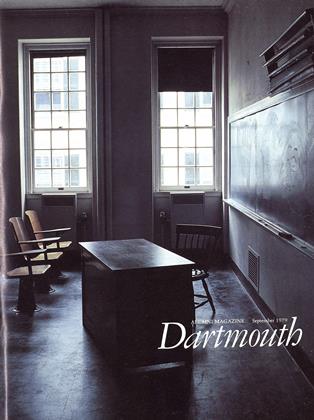Following President Kemeny's appointment as chairman of President Carter's commission to investigate the accident at the Three Mile Island nuclear plant, the Dartmouth Board of Trustees established a special subcommittee composed of trustees Walter Burke '44 (chairman), Richard Hill '4l, and Richard Lombard '53 to "establish and implement policies and guidelines for areas of the College (including the associated schools) which might be affected by the activities and recommendations of the commission" — in short, to avoid any suggestion of a conflict of interest for the College or Kemeny.
The guidelines concerning investment activities stipulate that anyone officially associated with the College refrain from giving Kemeny or his office staff any College investment information, and that Kemeny and his staff not share with anyone at the College any information about the commission. Investment advisers were instructed to deal with the College only through the trustees' investment committee or Dartmouth's investment and legal offices. The guidelines for fundraising activities state that gift proposals are not to be made to corporations or their affiliates "that are engaged to a material extent [five per cent or more of sales] in the business of designing, constructing, supplying, operating, or providing fuel for nuclear generating equipment and facilities." Except for regular annual giving solicitation, the same prohibition applies to requests made of officers, directors, and major stockholders of corporations engaged in the nuclear power business. Also, according to the policy, any existing fund-raising activities that would be affected by the prohibition are suspended.
Kemeny has attempted to split his time roughly in half between commission and Dartmouth business, and three College officers have been empowered to make decisions in his absence: Leonard Rieser '44, provost and dean of the faculty, has charge of academic matters; Ralph Manuel '58, dean of the College, acts on student affairs; and William Davis, treasurer, attends to financial business. In order to keep Kemeny's right hand from knowing what his left is doing, his assistant, Alex Fanelli '42, has divided his office operations, reassigning some of the staff and hiring an assistant to deal with the commission.
So far, Kemeny has been getting high marks in Washington for his independence, common sense, and ability to explain complex technical problems in plain English. "When the plant operators go off into the esoteric lingo of their trade, he rephrases their obscurities into language that a nuclear illiterate can understand," Mary McGrory observed in one of her columns this summer. The commission has also received praise for the brisk pace of its inquiry, attributed in part to its members' lack of political ambition and their freedom from influence by power companies.
The commissioners, their full-time staff of 60 people, plus outside consultants, have been pressing to meet the October 25 deadline for their report. Kemeny said at a press conference in early August that he wanted to wind up the investigative stage by the end of the month. Although the commission was working hard, he said, it was not moving in such haste that it failed to investigate the major issues.
Kemeny has described one of the major problems behind the Three Mile Island incident as machinery that required too much of its operators, particularly in an emergency, and suggested that more informed and efficient use of computers, both in plant operations and in simulating malfunctions, might be a way to avoid similar accidents in the future. "There are certain technical flaws an operator should not be allowed to make," he told reporters. "If you can simulate space shots, nuclear plants are not that much more complex." he added. "There was no system of priorities during the accident. You need a few key indicators. Computers can help. Computers can ask the key questions."
Despite Carter's favorable statements this summer about the future of nuclear power, and despite complaints by members that the President was exerting some pronuclear pressure on the commission, Kemeny has maintained that the commission's conclusions will not be compromised. By way of emphasis, he has publicly referred to the possibility that the commission could make a general recommendation against nuclear power if its findings lead toward that conclusion. Kemeny has also called attention to Carter's promise, made just before the commission's first meeting, to implement its recommendations whatever they turned out to be.
At a press conference late this summer, Kemeny elaborated on an analogy he had previously made, comparing the commission to a university: "I said that the commission members, in effect, were the board' of trustees, that the staff was the administration of the institution, and that the chairman has the famous ambiguous role that university presidents play: On the one hand, he is a member of the board of trustees but has only one vote and also takes instructions from the commission members; on the other hand, he is the head of the staff. I think all the ambiguities and complications of the university structure have manifested themselves in the workings of the commission." He went on to compare the commission's citizens' advisory group, which did some public complaining, to a university faculty.
 View Full Issue
View Full Issue
More From This Issue
-
 Feature
FeatureUps and Downs in the Big Leagues
September 1979 By Keith Bellows -
 Feature
FeatureTemples, Turtles and Fat Boys
September 1979 By Dan Nelson -
 Feature
FeatureThe Kids Danced
September 1979 By Robert Feakins -
 Article
ArticleThe Bard's American Friend
September 1979 By Michael Colacchio '80 -
 Class Notes
Class Notes1954
September 1979 By JOHN L. GILLESPIE, Fred Alpert '54 -
 Class Notes
Class Notes1974
September 1979 By WILLIAM B. CATER JR.








